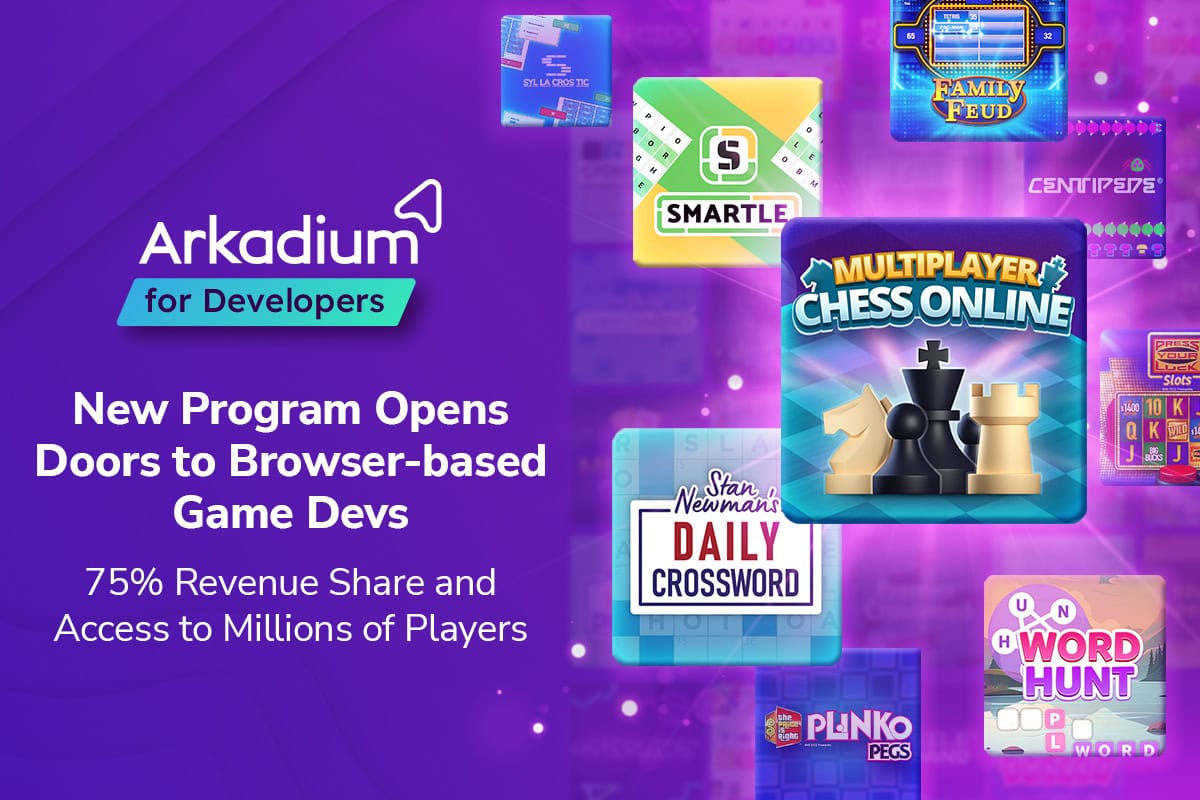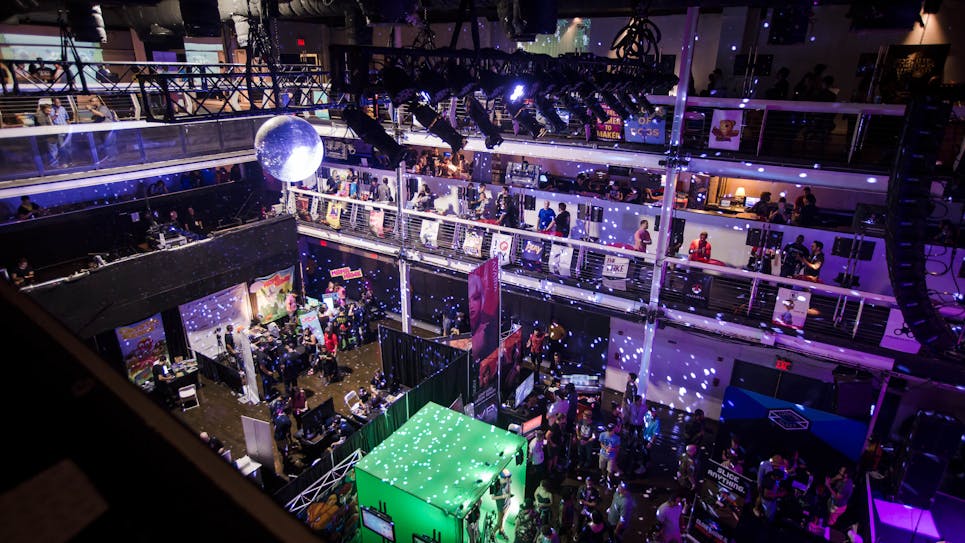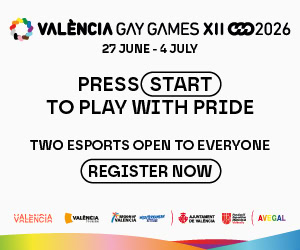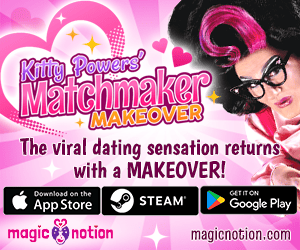
Spotlight on… Dan Butchko
Dan Butchko will be best known to a lot of people as the creator of Play NYC, New York City’s premier games event. However, he’s also been working as an out and proud member of the LGBTQ community in the games industry for over 10 years.
Dan recently joined Arkadium, a leader in browser-based games (BBGs), as Director of Developer Relations to lead their newly minted Arkadium for Developers program.
I got to sit down with Dan to talk about his work, why browser-based games are ripe for LGBTQ storytelling and his passion for supporting fellow LGBTQ gaming professionals through major meet up events.
Hi Dan, thanks so much for joining me, let’s start out with you introducing yourself to our readers and tell us what is your current role in the industry?
Dan: Hi everyone! I’m Dan Butchko. I’m originally from New Jersey and have lived in and around New York City my entire life. I absolutely love video games and think they are the greatest medium on the planet. Games have the unique power to entertain and unite people of all walks of life through play, regardless of where they’re coming from. I have a deep affection and appreciation for the people who make games. I studied social work in college and have carried that framework into all that I do. I think it’s important to have a people-first approach to my work. When you can both empower people and build strong businesses through games, everybody wins – especially players.
I joined Arkadium as its first-ever Director of Developer Relations earlier this year. At Arkadium, I’m responsible for bringing great games from great developers onto our platform. We’re building the future of browser-based games. It takes a village to get there, and I have the pleasure of getting to work with developers around the world to make that happen.
What was your journey that got you to the position you’re in today?
For the first six years out of school, I ran events and marketing for a great charity called Help For Children, where we raised money for child abuse prevention and treatment. One afternoon, I spent a solid six hours making a detailed and ranked list of every game I’ve ever played – I still keep my Ultimate Games List up to date to this day!
It was then that I realized my deepest and most consistent passion in life was games. After going to my first Game Developers Conference in 2012, I was able to see thousands of people around the world building a career through games. It was then that I knew I had to pursue games for my career.
After leaving HFC, I volunteered for some local events, including Games For Change, and joined a bunch of Meetup groups. One of those groups was called The NYC Games Forum. I remember going to my first NYCGF event – a showcase of dozens of games made in and around NYC. My mind was blown by how many games and developers were in my own backyard that I had never heard of. I eventually took that Meetup and turned it into Playcrafting, where I was passionate about giving that same mind-blowing experience of discovery for players around the world to discover games from companies they never heard of.
I was fortunate to build and run Playcrafting as its Founder and CEO for almost nine years. In that time, I turned the local meetup into a global developer network of more than 30,000 people. We produced over 300 events and classes for game developers and fans and built 150+ games and demos for the world’s biggest brands including Bose, Verizon, Epic Games, Schick, and more. I also hosted the biggest Global Game Jam site in North America for seven years in a row. It was such a blast and a wild ride.
In late 2022, I decided to leave Playcrafting and pursue my next chapter. After a brief stint with MrBeast in North Carolina, I came back up to New York City and joined Arkadium. I’ve known Kenny Rosenblatt, the CEO, and Arkadium for almost a decade through Playcrafting. It’s been such a great fit so far. I couldn’t be more excited for what we’re building.
You’re currently heading up Arkadium for Developers, tell me more about that and do you see it being a good fit for LGBTQ developers?
Yes! It’s been an amazing opportunity to launch Arkadium for Developers as one of my core responsibilities here at Arkadium. The reception has been really positive, which makes me proud and speaks to the value we’re bringing to indie developers. This program opens the doors to our platform to developers around the world with a low barrier for entry. We’re looking for developers to build great games with us, and offer two models – second party for games to publish and third party to license games.
Arkadium’s platform welcomes over 18 million players per month across hundreds of websites, including Arkadium.com, The Washington Post, USA Today, and more. We’ve got a huge player base, with most located in North America and the UK.
Arkadium for Developers is as accessible to developers as browser-based games themselves are accessible to players. This is certainly by design as we pride ourselves on being developers for developers. We worked hard to make sure developers of all stripes could succeed with us. This is why our revenue share for developers is a remarkable 75%. And in a particularly challenging time for our industry as a whole, our evolving platform is a great place to do so.

Why are browser-based games so good and what are their strengths for LGBTQ developers?
Prior to joining Arkadium, I wasn’t aware of what a vibrant and thriving landscape there was for BBGs. Browser game players are diverse in terms of background and location because BBGs are so accessible. All you need is a browser to play our games and others. It’s relatively easy to launch your game to millions of players on a browser. We’ve seen that through a number of sites, including all the incredible grassroots games being launched on itch.io.
Many LGBTQ developers struggle in having their game stand out in a crowded marketplace. It can be disheartening to express yourself through the games you build only to have less players experience them than expected. Tell your stories through your games in a way that meets them where they’re at with no additional cost to the player – the browser! There are all sorts of games available on browser – from casual puzzle games to more in-depth narrative adventures. As BBGs continue to grow, so too will the player base. Build your player community alongside the BBG community to establish a lifelong connection to the people who play your games.
Bringing small and diverse developers together is so important and something you’ve done successfully with Play NYC, what’s some of your best memories from Play NYC?
I’ll never forget the first Play NYC in 2017… I walked into the event as it started after over a year of my team pouring our blood, sweat, and tears into the event while just hoping people would show up. When I saw that so many developers brought their games for thousands of players to play, it brought tears to my eyes. As the years went on, I built a Graffiti Games program where we funded underrepresented developers to build exclusive games that would launch at the show.
In our last live show before the pandemic, we celebrated the 50th anniversary of Stonewall and NYC hosting WorldPride at Play NYC 2019 with a special Pride edition of Graffiti Games for LGBTQ developers. It was so cool to see each developer transform the space with their stories. These were interactive installations with games telling the stories of LGBTQ folks. One of my favorites was a game called Staring is a Form of Harassment. In this game, you avoid lasers shooting out of the eyes of creatures on the subway. It was inspired by the feeling of being stared at in a hateful way in public spaces.
Community can be built in a lot of ways. But for me, nothing beats connecting with other people in person. Play NYC epitomized this feeling for me in my time at Playcrafting.

What more does the industry need to be doing more of to address issues of equality and diversity?
It’s important to create pipelines for games to succeed, regardless of who built them. Part of this work is to go out on the ground level to find games and developers where you wouldn’t normally look. This is a big reason why I still like to go out to local meetups and find folks in smaller online communities.
There’s a fine line between tokenizing and empowering. The key is to offer support and meet developers where they’re at. That includes helping rising developers who are just getting started, a clear look at the industry’s landscape and helping them to build business acumen alongside their creative development skills. This is by no means easy to do. It can’t be automated. But it builds longer-term relationships, strengthens developers on a number of levels, and can level the playing field for those from underrepresented communities.
What would be your advice for a young LGBTQ person starting out or looking to get into the video games industry?
As LGBTQ folks, it can be really exciting to want to shout from the mountaintops as we become more comfortable in our own skin and find our place in the world. Having gone through it myself, I would learn the art of listening above all else. Make it your superpower to be curious, ask questions, and build connections. It can be tough sometimes to connect with someone that is from a really different background than our own. Lean into what unites us in the industry – the shared love of games. And I’ll always encourage you to get out of the house and meet people IRL! You have to put yourself out there to build a career. Be honest about what you don’t know. Ask a ton of questions. And build relationships with people in the industry regardless of what that relationship could mean for your career in the short term.
On top of all that, the tools you need to learn are more accessible than ever. You don’t need a college degree to make games. You can start now, on your own, and for free! Use free online resources provided by the different game engines. Read the basics of game design. The best way to get good at making good games is to start by being great at making terrible ones! It’s an iterative journey where repeated failure is the only way to learn.
What was your earliest memory of video games as a child?
I’ll never forget sitting in my living room at four years old watching my mom play the original Legend of Zelda game. The pixels danced on the screen. And it blew my mind to know my mom was making them move like that.
What are you currently playing?
After 160 hours, I finally decided to finish the story in Tears of the Kingdom. What an incredible ride. The middle 100+ hours of my time with it were so full of wonder and oddly grounding at a time when I was going through some big changes in life. And just last week, I finally finished The Last of Us Part II. I’ve been playing big games like that with loads of Balatro and – of course – a ton of BBGs mixed in.
What does the future hold for you?
I’m helping build the world’s best platform for browser-based games at Arkadium! I couldn’t be more excited to open doors for creators and games in a space that many don’t even think about. The industry is ripe for the next generation of BBGs to make a great impact, and I think we’re in a great position here at Arkadium to help raise more awareness and opportunities for our category, developers and gamers alike.
On the personal side of things, I’ll be spending as much time in nature as I can with my husband and our dog. I’m finally also starting to plan a big trip to Japan to connect with a culture I feel deeply connected to through games and anime. And of course, I’ll be playing more games!





